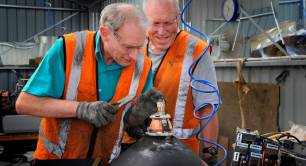Why environmentalist Jonathon Porritt is speaking at SEWF
What does caring about the environment have to do with social enterprise? Ahead of his appearance at the Social Enterprise World Forum, we talk to Jonathon Porritt to find out.
Jonathon Porritt can be considered as somewhat of a seer.
Before you'd ever heard of climate change or recycling bins he became chair of the Ecology Party (which eventually became The Green Party) in 1979. He'd first become interested in environmental issues in 1974.
Seeing Green: Politics of Ecology Explained, published in 1984, predicted an “information rich, knowledge poor” future. Anyone prone to the many distractions of the internet can make their own minds up about that.
In the same year, he became director of Friends of the Earth. In the six years he was at the helm, membership grew from 12,700 to 226,300. He has referred to taking the job as “the best decision of my life.”
When it's suggested to him that we are all much more aware of our responsibilites to the environment he reacts with a slight sigh: "We've been talking about these environmental issues for so long that people kind of assume they have been sorted out. That is so far from the case."
"But you'd be crazy not to be encouraged by the increasing awareness, particularly by young people.
"What we haven't yet got is a conversion of all of that awareness into a readiness to change the way we live, the way we create wealth, the way we think about our political systems."
He remains frustrated by the leaders of countries and clearly thinks they should be doing more.
"Our political class, if I can call them that... don't seem to turn any of that increased awareness into new ways of establishing ground rules for new ways of managing our environment or managing our economy."
Having spent six years working with Tony Blair's government between 2000 and 2006, he seems well placed to make such a comment.
These days most of his work is for Forum for the Future, a consultancy he co-founded that advises organisations how to make themselves sustainable by looking at their food and energy systems.
One example is British high street staple Marks and Spencer (M&S). Concerned by climate change, the company wanted to improve the environmental and social aspects of its retail business.
M&S has reduced its emissions by 20% since 2006 and worked with suppliers to encourage both better stewardship of water use and women’s empowerment.
It remains somewhat surprising to find he is speaking at the Social Enterprise World Forum (SEWF). What does caring about the environment have to do with social enterprise and what will he be speaking about there?
“We have opportunities now to build this much more participative, equitable system of generating value for people, for communities, for society as a whole,” he told us.
“You can’t sort out the environment by narrowly thinking about protecting wild spaces, and threatened species – we have to have a different economic model.”
To find out more about why he’ll be appearing in Christchurch on September 27th-29th, watch our film above.
Pioneers Post is media partner to the Social Enterprise World Forum 2017, which will be held in New Zealand on 27-29 September. For more details, see www.sewf2017.org.



